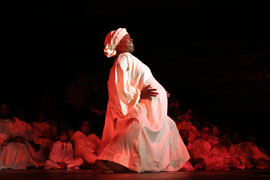 Part of the annual squabble about the extent to which a Christian festival should be marked in the public life of a plural nation like Britain has been a rather thin running commentary on the biblical stories concerning the birth of Christ. What is striking about the response of both ardent secularists and religious fundamentalists is that they read texts in such a narrow, unimaginative way. One side pronounces with great solemnity its non-acceptance of these ‘made up stories’, while the other insists that every detail is some forensic description of an ancient event. The rest of us, I guess, can only wonder at the naiveté of treating evocative narratives in such a stultifying way.
Part of the annual squabble about the extent to which a Christian festival should be marked in the public life of a plural nation like Britain has been a rather thin running commentary on the biblical stories concerning the birth of Christ. What is striking about the response of both ardent secularists and religious fundamentalists is that they read texts in such a narrow, unimaginative way. One side pronounces with great solemnity its non-acceptance of these ‘made up stories’, while the other insists that every detail is some forensic description of an ancient event. The rest of us, I guess, can only wonder at the naiveté of treating evocative narratives in such a stultifying way.The Gospel accounts of the birth of Jesus act as a powerful reminder that in this wonderful and perilously fragile world we have been gifted, you can’t have glory without muck – and vice versa. The search for unalloyed purity is as dangerous as the abandonment of a vision which elevates the mundane. The nativity is also, about a radical reordering of the way we perceive the world and shape our relationship with God. The eisegetical wisdom of the Magi, based reading the interests of the powerful back into the heavens, is supplanted by an event which claims that the essence of divine favour is to be found, instead, in honouring the vulnerability of flesh. Their gifts – gold, frankincense and myrrh, representing imperial splendour, religious rule and suasion over death – prove instructively redundant. Jesus grows up to refuse them all, and instead to initiate a gift economy based on Beatitude sharing rather than the blandishments of earthly power. This is the deep truth which those who squabble over their control of ‘the facts’ are in danger of missing altogether. [Picture: A scene from the log-running ‘Black nativity’, Boston, USA]
Comment on this post: FaithInSociety

No comments:
Post a Comment